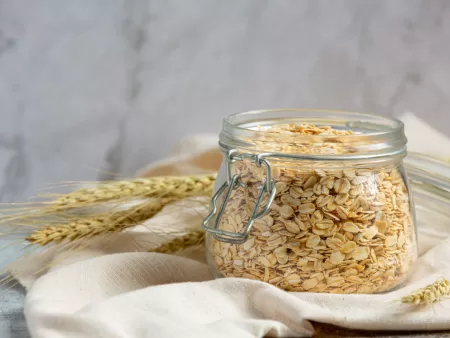
Whether you’re looking to improve your diet or find natural remedies for common health problems, fenugreek offers a wealth of options. Packed with vitamins, minerals, and fiber, it stands out for its ability to support glycemic control, control cholesterol, promote digestion, and relieve inflammation.
The Nutritional of Fenugreek
Voyage into the realm of fenugreek seeds, where the luminary nutrient, vitamin C, heralds robust immunity and cellular rejuvenation. This indispensable antioxidant embarks on a crusade against oxidative adversaries, safeguarding the body’s bastions against disease incursions.
Mineral Marvels in Fenugreek
Potassium, the heart’s metronome, ensures life’s rhythm remains unimpeded, orchestrating a ballet of muscle and neural functions. In this mineral mosaic, calcium emerges as the scaffold of skeletal strength and the maestro of muscular and vascular harmony. Iron, the vital breath of cells, banishes the specters of lethargy and pallor, while magnesium, the catalyst of cellular alchemy, upholds the edifice of metabolic and bone health.
Entwining Fibers and Proteins in Fenugreek’s Tapestry
Within fenugreek’s woven tapestry lies a blend of dietary fiber, the sentinel of digestive tranquility and a bulwark against the tide of chronic maladies. This fibrous network curtails the pangs of hunger, guiding the scales of weight equilibrium. Parallel to this, the saga of proteins unfolds, champions of regeneration and architects of bodily fortitude, catering to those in pursuit of verdant sources of sustenance.
Fenugreek’s Multifaceted Health Contributions
Glycemic Equilibrium Enhancement
Among fenugreek’s arsenal for health, its prowess in glycemic control shines prominently. The seeds are laden with soluble fiber, a crucial element for moderating the entry of glucose into the circulatory system. This mechanism is a boon for individuals grappling with diabetes, offering a method to mitigate abrupt surges in blood glucose following meals. Thus, fenugreek plays a supportive role in the diabetes care regimen, aiding in the achievement of balanced glucose levels.
Heart Health and Cholesterol Management
The beneficial impacts of fenugreek extend to cardiovascular wellness, particularly through its influence on cholesterol management. Its potent mix of saponins and fiber work in concert to bind with cholesterol molecules, promoting their elimination from the body. This process may lower harmful LDL cholesterol and has the potential to uplift the levels of protective HDL cholesterol. Regular consumption of fenugreek can contribute to a heart-healthy lipid profile, supporting overall cardiovascular function.
Digestive System Support
Fenugreek’s contribution to digestive health is powered by its rich content of galactomannan fiber. This specific type of fiber acts as a gentle laxative, enhancing bowel movement efficiency and preventing constipation. It not only aids in the facilitation of regular bowel activity but also plays a vital role in maintaining a healthy gut microbiome. Fenugreek thus stands as a natural aid for promoting digestive health and sustaining gut balance.
Alleviating Inflammatory Conditions
Fenugreek’s anti-inflammatory capabilities offer natural relief for various conditions characterized by inflammation. Its mucilage acts as a soothing agent for affected areas, easing discomfort associated with muscle soreness, dermatological irritations, and other inflammatory ailments. This herb’s capacity to pacify inflamed tissues highlights its value in a comprehensive approach to managing inflammation.
Lactation Enhancement
Traditionally celebrated for its galactagogue effects, fenugreek has been utilized to foster milk production in nursing mothers. While research into the exact mechanisms by which fenugreek enhances lactation is evolving, the herb is reputed to significantly support milk supply, drawing on both anecdotal and scientific evidence. However, it’s prudent to seek advice from a medical professional before integrating fenugreek or any supplementary herb into a lactation-enhancing regimen.
Insight into Fenugreek’s Less Known Effects
Fenugreek, while laden with health-promoting properties, occasionally unveils side effects, especially when its intake surpasses customary amounts. Some individuals might encounter digestive upsets, manifesting as either mild abdominal discomfort or more pronounced diarrhea. This is largely due to fenugreek’s dense fiber composition, which, though typically advantageous for digestion, can prove too robust for those with delicate digestive systems.
Odorous Anomalies: A Quirk of Fenugreek
An intriguing, yet completely benign, side effect from consuming fenugreek is the emergence of a maple syrup-like aroma in one’s urine, and occasionally, sweat. This distinctive scent originates from sotolon, the chemical giving fenugreek its notable smell. While this might catch some off guard, it’s a harmless, albeit rare, bodily response to the herb.
Advisories for Pregnant Individuals
Expectant individuals should tread carefully with fenugreek due to its potential to induce uterine contractions. Although it has been historically utilized to assist in childbirth, modern caution suggests limiting or supervising its use during pregnancy to avoid any possible complications to either the mother or the unborn child.
Pharmaceutical Interplays: Exercising Vigilance
Fenugreek’s capability to interact with certain medications, particularly those concerning diabetes management and blood clotting, necessitates caution. Its effect on reducing blood sugar levels demands that individuals on diabetes medication consult with healthcare professionals to mitigate the risk of hypoglycemia. Furthermore, for those on blood-thinning medications, fenugreek’s potential to enhance their effect warrants professional oversight.
Rarity of Allergic Reactions
On the rare occasion, fenugreek can trigger allergic reactions, which may range from minor skin irritations to more severe conditions like respiratory distress. Immediate medical attention should be sought if such symptoms arise following fenugreek ingestion.
Guided Use of Fenugreek
In conclusion, fenugreek’s bounty of benefits comes with a side note of potential adverse effects. Awareness and moderation are key, with a strong recommendation for consultation with a healthcare provider before integrating fenugreek into one’s diet or health regimen. This is especially pertinent for individuals with pre-existing health conditions, pregnant individuals, or those under medication, ensuring fenugreek’s benefits can be safely harnessed.
Fenugreek’s Rich Tapestry of Applications
- Culinary Alchemy with Seeds: – Fenugreek seeds, when roasted or soaked, transcend ordinary flavor boundaries, offering a sweet, nutty zest to a variety of dishes. These seeds are the secret ingredient in enriching flavors across an array of cuisines, adding depth to everything from savory curries to comforting stews.
- Greens of Grace: Methi Leaves: – The green splendor of methi, fenugreek’s leafy, brings an aromatic depth to culinary creations. Freshly sautéed or delicately dried, methi leaves are a testament to the herb’s versatility, imparting a complex blend of bitter-sweetness to an assortment of dishes.
- Sprout Symphony: – Sprouting fenugreek seeds softens their inherent bitterness and enhances their nutritional orchestra. Add these sprouted gems to salads, sandwiches, and wraps for a lively, peppery bite.
- Herbal Harmony in Tea: – Fenugreek tea, crafted from steeping its seeds, is a soothing elixir celebrated for digestive health and glycemic control. This tranquil brew is a testament to fenugreek’s gentle, healthful embrace.
- Wellness in a Capsule: Supplements: – For those drawn to fenugreek’s healthful promise, supplements in capsules or powder form provide a potent pathway. These concentrated forms are a testament to modern convenience, offering fenugreek’s benefits with ease, guided by professional counsel.
- Revitalizing Essence: Fenugreek Oil: – Extracted into oil, fenugreek seeds share their anti-inflammatory magic with the realm of beauty. This elixir is cherished for its capacity to nurture and heal skin and hair, revealing fenugreek’s restorative secrets.
- Flavor Fusion: Fenugreek Powder: – The powdered essence of fenugreek seeds is a culinary quick-fix, ready to sprinkle its distinct flavor and health advantages into meals and drinks, simplifying the integration of this ancient herb into modern diets.
Fenugreek Myths Unwound
Myth 1: A Singular Solution for Diabetes
The belief in this herb as a standalone cure for diabetes is one of the most persistent myths. While beneficial in regulating glucose levels, it should complement, not replace, prescribed treatments, with adjustments made only under medical supervision.
Myth 2: Guaranteed Weight Gain
Contrary to the notion that its consumption leads directly to increased body weight, its high fiber content actually aids in weight control by enhancing feelings of fullness. There’s no concrete evidence to support the claim of it causing weight gain.
Myth 3: Only Beneficial for Women
While known for its benefits in women’s health, particularly lactation, its advantages extend beyond, aiding in digestion and cholesterol management for all, making its benefits universal.
Myth 4: Cure-all for Digestive Woes
Attributing it as a universal remedy for digestive problems is misleading. It can alleviate mild issues through its fiber content but isn’t a substitute for medical intervention in more serious conditions.
Myth 5: Free from Any Side Effects
The assumption that this herb is devoid of side effects is incorrect. While safe for most, it can cause discomfort, especially in large doses, and should be used cautiously by pregnant individuals due to potential uterine stimulation.
Conclusion
Packed with vital nutrients including vitamin C and key minerals, this herb enhances overall well-being. Benefits span glycemic control, lipid management, digestive aid, and reducing inflammation. Interactions with certain medications and possible adverse effects warrant careful use and healthcare consultation. Its utility ranges from culinary enrichment to health supplements and skincare applications. Dispelling myths, particularly around diabetes care and weight concerns, highlights the importance of informed usage.
FAQs
It should not replace medical treatments but may serve as a supplementary aid with doctor approval.
Actually, its rich fiber content might support weight management efforts by enhancing feelings of fullness.
No, its array of health perks, from aiding in digestion to lipid regulation, benefits a diverse audience regardless of gender.
While helpful for mild digestive discomforts, it’s not a standalone remedy for more severe digestive health issues.
Generally considered safe, it may lead to minor digestive upset in certain individuals, particularly with overconsumption.
Versatile in form, it can be introduced into recipes as seeds or leaves, enjoyed as a soothing tea, or taken as dietary supplements for targeted health outcomes.







